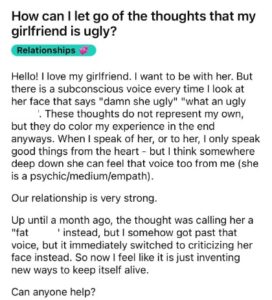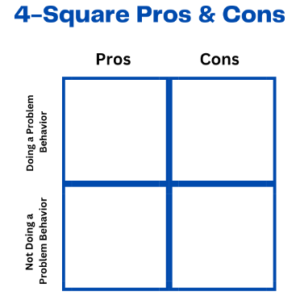Why “I Let the Intrusive Thoughts Win” is Harmful: The Difference Between Intrusive Thoughts and Impulsivity
It’s not uncommon nowadays to hear someone say “Yeah I dyed my hair last night because I let the intrusive thoughts win.” Maybe you’ve even thought to yourself “I’m going to let the intrusive thoughts win and cut myself bangs” or something along those lines. But what actually are intrusive thoughts and why are casual phrases like this harmful?
Intrusive thoughts are generally associated with Obsessive-Compulsive Disorder (ODC). These thoughts can usually be identified as something the person does not personally believe; they are intruding on your normal, everyday thought process.
For people with OCD, acting on intrusive thoughts or “letting them win” is the last thing they want to do, and that’s what makes it obsessive. Compulsions are repetitive actions in an attempt to negate obsessive thoughts. For example, an obsessive or intrusive thought would be “I think I hit someone while I was driving but didn’t notice in the moment” and the compulsion would be going back to constantly check and see if someone actually got hit.
A very common misunderstanding of OCD as being a “clean freak” or wanting everything to be organized and perfect can be very harmful because it misconstrues the true definition of this mental illness. Additionally, casual language, especially “letting the thoughts win” can be very harmful and dismissive of the experiences of people with mental illness. The casualness also leads to misrepresentations and a lack of understanding of OCD.

(Wanting to put jewelry on your plants is NOT an intrusive thought.)

(Having specific and negative thoughts that are not your own about your girlfriend ARE intrusive thoughts.)
This distinction is important as identifying mental disorders can be empowering for those who experience intrusive thoughts. It’s also important that representation of mental illness is correct so people can better understand and support people who may be struggling.
If you or someone you know is struggling with intrusive thoughts or OCD and want help or support, schedule a session with a mental health clinician here. Exposure and Response Prevention (ERP) Therapy is commonly used to treat individuals with OCD.
Impulsivity
Now that we’ve covered intrusive thoughts, what are impulsive behaviors? Impulsive behaviors are a reaction to certain situations that are not planned and the consequences of said actions are not thought through. These behaviors are often risky or inappropriate for the given situation and generally have negative consequences.
Cutting your bangs or dying your hair at 1 am could be defined as impulsive behavior if it is unplanned and the negative consequences are not considered. Repeatedly cutting your hair because you have negative thoughts about your appearance would be considered compulsive behavior.
Impulsive behaviors are often associated with attention-deficit/hyperactivity disorder (ADHD), personality disorders (such as borderline personality disorder), or substance use disorders. DBT, or Dialectical Behavior Therapy, is often used to treat impulsive behaviors. DBT works with the “wise mind” which is the middle ground between your “emotional mind” and your “rational/reasonable mind.” By thinking with your “wise mind” we can picture what is true and begin to unlearn thought processes that cause impulsive behaviors. An activity your therapist might do with you would be the Four Square Pros and Cons as laid out below:

Learn more about DBT and its uses here.
Sources:
- Heather A. Berlin, P., & Eric Hollander, M. D. (2008). Understanding the Differences Between Impulsivity and Compulsivity. 25.
- https://www.psychiatrictimes.com/view/understanding-differences-between-impulsivity-and-compulsivity
- How to Check Your Impulses Using DBT – Pine Rest Newsroom. (2019, May 20). https://www.pinerest.org/newsroom/articles/how-to-check-your-impulses-using-dbt-blog/

